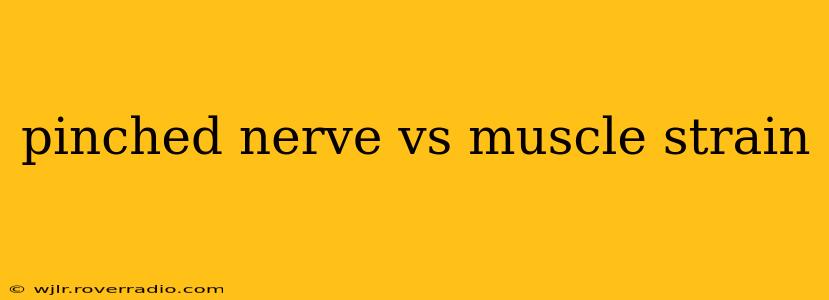Experiencing pain in your body can be incredibly frustrating, especially when you're unsure of the underlying cause. Two common culprits are pinched nerves and muscle strains. While both can cause significant discomfort and limit your mobility, they stem from different issues and require different approaches to treatment. This comprehensive guide will help you understand the key differences between a pinched nerve and a muscle strain, allowing you to better communicate with your doctor and seek appropriate care.
What is a Pinched Nerve?
A pinched nerve, also known as a compressed nerve, occurs when surrounding tissues, such as bones, cartilage, tendons, or muscles, put pressure on a nerve. This pressure can disrupt the nerve's function, leading to a range of symptoms depending on the location of the pinched nerve. The pressure can be caused by a variety of factors including:
- Poor posture: Prolonged slouching or awkward positions can put pressure on nerves.
- Injury: A direct blow or trauma to the area can lead to nerve compression.
- Repetitive movements: Repeated actions, particularly those involving awkward postures, can irritate and compress nerves.
- Underlying medical conditions: Conditions such as arthritis, spinal stenosis, or herniated discs can put pressure on nerves.
What is a Muscle Strain?
A muscle strain, often called a pulled muscle, is an injury to a muscle or tendon (the tissue connecting muscle to bone). This occurs when a muscle is overstretched or torn. The severity of a muscle strain ranges from mild (a slight overstretch) to severe (a complete muscle tear). Common causes include:
- Sudden forceful movements: Lifting heavy objects improperly or engaging in strenuous activity without proper warm-up can cause muscle strains.
- Overuse: Repetitive movements or excessive physical activity can lead to muscle fatigue and strain.
- Poor physical condition: Weak or inflexible muscles are more susceptible to injury.
What are the Symptoms of a Pinched Nerve?
Symptoms of a pinched nerve vary depending on the location of the nerve compression. Common symptoms include:
- Sharp, shooting pain: Often described as radiating or electric pain that travels along the nerve's path.
- Numbness: A loss of sensation in the affected area.
- Tingling: A pins-and-needles sensation.
- Weakness: Difficulty controlling or using muscles supplied by the affected nerve.
- Burning sensation: A burning or searing pain.
What are the Symptoms of a Muscle Strain?
Muscle strain symptoms also vary depending on the severity of the injury. Symptoms include:
- Muscle pain: A dull ache or sharp pain in the affected muscle.
- Muscle spasms: Involuntary muscle contractions.
- Swelling: Inflammation around the injured muscle.
- Bruising: Discoloration of the skin.
- Limited range of motion: Difficulty moving the affected muscle.
How are Pinched Nerves and Muscle Strains Diagnosed?
Diagnosing both conditions usually begins with a physical examination. Your doctor will ask about your symptoms, medical history, and any recent injuries. Imaging tests, such as X-rays, MRIs, or CT scans, may be necessary to confirm the diagnosis and rule out other conditions. For muscle strains, imaging is often less necessary than for pinched nerves, which may require imaging to visualize the nerve compression.
How are Pinched Nerves and Muscle Strains Treated?
Treatment for both conditions focuses on pain relief and restoring function. Common treatments include:
- Rest: Avoiding activities that aggravate the pain.
- Ice: Applying ice packs to reduce swelling and pain (especially beneficial for muscle strains).
- Heat: Applying heat packs to relieve muscle spasms (often more helpful for muscle strains than pinched nerves).
- Over-the-counter pain relievers: Medications such as ibuprofen or acetaminophen can help manage pain and inflammation.
- Physical therapy: Exercises to strengthen muscles, improve flexibility, and restore range of motion.
- Medications: In some cases, stronger pain relievers or muscle relaxants may be prescribed. For pinched nerves, corticosteroids may be injected to reduce inflammation.
- Surgery: In severe cases, surgery may be necessary to relieve pressure on a pinched nerve or repair a severely torn muscle.
How Can I Prevent Pinched Nerves and Muscle Strains?
Preventing these conditions involves focusing on good posture, proper lifting techniques, regular stretching, and strengthening exercises. Maintaining a healthy weight also reduces strain on muscles and joints. Always warm up before exercise and cool down afterward. Pay attention to your body and stop if you feel pain.
Can a Pinched Nerve Cause Muscle Strain?
While not directly causing a muscle strain, a pinched nerve can indirectly contribute to muscle problems. The pain and impaired function associated with a pinched nerve can lead to muscle weakness, atrophy (muscle wasting), and potentially increased susceptibility to strain if the muscles are not properly supported and strengthened.
Can a Muscle Strain Cause a Pinched Nerve?
In some cases, severe muscle spasms or swelling from a muscle strain can indirectly compress a nearby nerve, leading to symptoms of a pinched nerve. However, the primary injury is the muscle strain itself.
This information is for general knowledge and does not constitute medical advice. Always consult a healthcare professional for diagnosis and treatment of any pain or injury.
